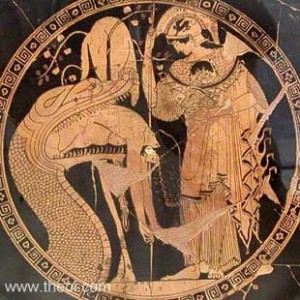Tony Glover : Hexham Courant
This is part of an interview with the Hexham Courant on the publication of Cars Just Want to be Rust.
The Answer is always the Golden Fleece
 The answer is always the Golden Fleece
The answer is always the Golden Fleece
I was trying to sort out a tricky plot problem with a story. It was the usual one – finding an ending that worked. I find the way to deal with a problem like this is to go for a walk. I was ambling along by the shops when the answer came to me, in a rush.
‘It’s the Golden Fleece, isn’t it?’ I muttered. I tend to say things like that out loud, which can be a worry.
At my school we used to read the Greek myths. Stories of the ecstatic frenzy of the maenads, the one eyed Cyclops, or Medusa with the snaky hairdo tend to stick in the mind of a nine year old boy.
The story of the Golden Fleece is that Jason was tricked into setting out on a quest by the king, Pelias.
Jason, a ‘tall, long haired youth, dressed in a close fitting leather tunic and a leopard skin,’ lived in Thessaly, in central Greece. He was handy with his broad bladed spears and had a claim to Pelias’s throne.
So King Pelias had a cunning plan for getting him out of the way. He promised to step aside if Jason would ‘free our beloved country from a curse.‘ It seems the king was being haunted by the spirit of Phrixus, who travelled about on the back of a sacred ram.
To break the curse, Jason had to ferry the ghost of Phrixus back from Colchis, the country we now know as Georgia, along with the fleece of the ram on which the ghost used to ride. The fleece hung from a tree in the grove of Ares, and it was guarded day and night by a dragon. A tricky journey – across the Aegean, turn right at the Sea of Marmara, right again at the Black Sea and keep going.
So Jason gathered comrades to accompany him on the Argo, the boat he’d had built for the voyage. Jason and his Argonauts set off to fetch the ghost and bring home the fleece.
Jason finally reached the dragon’s grove. He was accompanied by Medea, the wife he’d acquired along the way. Medea soothed the dragon with incantations and sprinkled a potion on the creatures eyelids. So Jason grabbed the fleece and set off back to Thessaly.
Even the road home was a nightmare. Jason lost many of his Argonauts. When he got back to Greece he discovered that the king had killed his parents, and to top it all Medea ran away with Zeus.
Jason died alone, homeless and despised. Even his death was a tragi-comedy. He was about to hang himself from the prow of the Argo when it toppled over and killed him. But he had succeeded. He brought home the treasure – the Golden Fleece.
This idea of the quest fits many film stories. The Fleece, the hero/ine’s goal, takes many forms. It might be love, or justice, or self knowledge. It might be the return of someone valuable. Think of The Searchers, with John Wayne as Ethan Edwards searching for Natalie Wood as Debbie Edwards, who had been taken by native Americans as a child. Or Paddy Considine as Richard in Dead Man’s Shoes, seeking vengeance on the men who tortured his brother. So the Golden Fleece might be revenge, or acceptance, or peace of mind, as well as treasure . It can be anything your central character desires, or aims to get.
Though this ending, the return with the Golden Fleece, fits many stories, it is particularly apt in screenwriting. Aristotle said ‘write with the ending in mind,’ and that works for film scripts, where we write backwards. In film we’re are always writing towards the end. Everything is geared towards the climax at the end of Act Three. The ending is crucial. It has a physical effect on the audience. A good, satisfying payoff gives the audience a rush of the oxytocin, sometimes called the ‘love hormone,’ after the cortisol they’ve been wallowing in during the rest of the story.
So the answer is always the Golden Fleece. The only problem that remains now is to decide, in this particular case, what the Golden Fleece might possibly be…
The Way Stories Work…
I’ve been giving some thought to the way stories work and the way they might be shaped to hold and satisfy an audience.
First, you need characters we care about. We don’t have to like them – but we need to care about the way things are going to turn out for these people .
Then we show a little bit about the sort of person they are and the life they lead.
At the start of your story, life is going on in the same old routine, whether your hero is a medical student in The Last King of Scotland or a hitman in Grosse Point Blank.
Now you throw a spanner into the works of this ‘Ordinary World’ of your character. In Psycho, Phoenix officeworker Marion Crane meets her lover Sam in lunch breaks. She discovers they can’t get married as Sam has gives most of his money away in alimony. One Friday, Marion is trusted to bank $40,000 by her employer.
In Dead Man’s Shoes, paratrooper Richard (Paddy Considine), returns to his small home town of Matlock in the Peak District because his younger brother has become the victim a local gang. In Little Miss Sunshine, Olive learns she has a place in the Little Miss Sunshine pageant in California.
Something occurs which throws your character into a spin – something which turns their ‘Ordinary World’ on its head. This does not have to be a huge event – though its consequences will turn out like that. In The Verdict, the legal drama written by David Mamet and directed by Sidney Lumet, this ‘Inciting Incident is a minor squabble. Frank Galvin, an ambulance chasing lawyer, is thrown out of a funeral home where he was touting for work. For the first time, Frank sees the truth about himself. He catches a glimpse of the image the rest of the world has about him – the once promising lawyer is a drunk, sniffing around the bereaved to pick up compensation claims.
In response to this incident, the hero/heroine decides to do something. They make their first act break decision. In Grosse Point Blank, professional assassin Martin Q. Blank (John Cusack) decides to attend his High School Reunion. In Psycho, Marion Crane decides to steal the money. In a love story it will be the decision to woo and win the heart of another character: in The Verdict Frank decides to fight a risky, but righteous claim against the Catholic Church. In a police drama, it’s the decision to solve the crime: it may be to find the treasure, free the prisoner, sing at the Albert Hall.
Whatever it is, your central character now has a goal. If we care about them, we’ll want to see them achieve it. We’ll stick with that quest: we’ll follow them through that journey.
Though your character now has a goal – something they know they want – there may be something else that we, the audience, sense they need.
It may be your hero wants to rob banks for the loot – like Bonnie and Clyde – but we can see they need more – perhaps it’s acceptance by the rest of the gang: perhaps it’s revenge on the cop who framed their father. In Sexy Beast, Gary “Gal” Dove needs to rob the bank to free himself of his past and resume his life in Spain with Deedee.
In one script I’m working on now, the central character wants to save a child who is being trafficked – that’s the goal she knows she wants. But in reality, we can see her need is something else – the love of another human being. Tara lost her mother when she was a child and has been seeking to restore that loss ever since.
So the goal is what your character wants: the dramatic need is what the audience can see they need.
Where were we…?
Your character wants something at the end of the story. As writers, it is out job to put something in the way.
A beautiful illustration of this can be found in the short film Ralph, written and directed by Alex Winckler.
Ralph is dim, badly dressed and way out of his depth. He arrives in Paris on the Eurostar, toting a huge suitcase.
He wants to find Clair, an old (girl)friend. She gave him her number – but it seems to be wrong. He asks a passerby, but Ralph doesn’t speak French, so barely understands the answer. When he discovers there’s a number missing from Clair’s telephone number – he asks the French man which one it might be…
Ralph uses all the credit on his phone card. So he goes to a cafe where the owner cons him into buying a meal so he can get a card. He sits down to a meal he didn’t want: the waitress trips over his giant suitcase. When Ralph finally gets a card card his phone still doesn’t work. In fury he tries to smash the phone.
The waitress takes pity on him. When they chat about Clair, the penny finally drops for Ralph. Clair doesn’t give a toss about him.
He decides he likes the waitress better. But just as he agrees to leave with her, Clair turns up…Ralph is faced with a dilemma – try to reconnect with Clair, or follow the Waitress, who’s disappearing into the distance. Dilemmas are great!
So the obstacles between Ralph and his goal, meeting Clair, grow higher and higher. The stakes are raised. This is vital. The consequences of your hero/heroine not reaching their goal need to be raised all the time. We want to feel that uncertainty – what will they do? The ‘boom-boom’ moment in Eastenders, the bombshell that lands just before the theme music kicks in.
So – raise the stakes. For example, if your character’s goal is a good night’s sleep, it’s not a disaster if they’re on holiday and they don’t manage to drop off. But if they’re at work the next day it takes it to another level. You have raised the stakes.
If they have a job interview the next morning, it’s raised further still.
If your heroine works in a betting shop, it might be a real problem if they can’t sleep. But it’s only money. If lives are at stake, it’s raised again. If they work as a doctor others might die. The stakes are raised again. But not as high as if your heroine is a bomb disposal expert called to diffuse a device in a busy shopping centre…
The best stories are those where we can’t predict the ending. Whether you allow your central character to achieve their goal or not, it’s that journey that keeps the audience with you until the end.
Current Writing Projects
I like to have to work on more than one writing project at a time. It helps to have stories stacked up and circling, like jumbo jets. That way, if I get stuck, or bored, I can move on and give my attention to the next one. Right now I’m working on three stories in various stages of development.
 Continue Reading
Continue Reading


